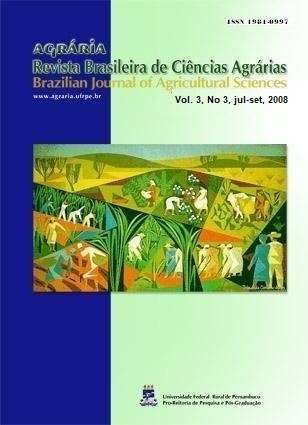Irrigation management and melon tolerance to the irrigation water salinity
DOI:
https://doi.org/10.5039/agraria.v3i3a264Keywords:
Cucumis melo L., soil saline, electric conductivityAbstract
The use of saline water for irrigation is very common in cultivation of melon in semiarid zones, which can result in the soil salinization if irrigation management is not appropriate. The present study had the aim to evaluate the effect on fruit yield and quality of two cultivars of melon, in relation to salinity tolerance under differentiated frequencies of irrigation. An experiment has carried out in the municipality of Mossoró-RN. The treatments were composed by combination of three factors: three waters of salinity levels (S1 - 1.1; S2 - 2.5 and S3 - 4.5 dS m-1), two melon cultivars (C1 - Honey Dew cultivar Orange flesh and C2 – cantaloupe hybrid Trusty) and two frequencies of irrigation (F1 - intervals of one day up to 35 days after sowing (DAS) and thereafter twice a day and F2 - interval of two days up to 35 DAS and there afler daily). The experiment was conducted in randomized blocks, with four replications, arranged in factorial design of 3 x 2 x 2. Results showed that the cultivars were significantly affected by salinity levels. The frequencies of irrigation F1 increased only the mean weight of fruit.



